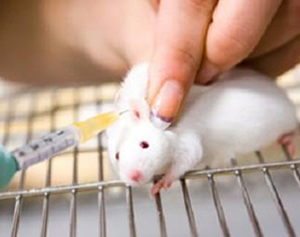Dramatic increase in animal experimentation over recent years, due to botox testing
The IAVS has been protesting against the dramatic increase in animal experimentation over recent years, which has been driven largely by the testing of botox-type products. Positive news emerged in March 2012 when ‘Botox’ producer Allergan announced they had developed a non-animal alternative to the extremely severe mouse LD50 test, which they claim will eventually reduce their animal testing by around 95%.
However, the IAVS was dismayed to learn that other botulinum toxin producers in Ireland, such as Ipsen and Merz, would continue to perform animal LD50 tests, contradicting the spirit of laws supposed to ensure that an animal test shall not be permitted if a scientifically satisfactory non-animal method is available. This scandal is compounded by the fact that most of these products are for the sake of vanity. But, according to the Irish Medicines Board and the Department of Health, this situation arises because the new Allergan test is effectively that company’s trade secret and so they had the right to keep it confidential rather than having to openly share it with Ipsen and Merz. Relatively trivial commercial considerations are resulting in severe animal cruelty.
This turns the spotlight on Allergan’s ethics: why have they failed to reach commercial terms with their competitors to share their non-animal test? Our concerns were reported in the Irish Times. Janet Kettles, Allergan’s ‘spin doctor’, claimed in a reply to the Irish Times that her company has published information about their new non-animal test in order to allow other botulinum toxin producers to develop similar assays. This gives the impression that the blame for this current situation lies mainly with the other botulinum producers. However, there may be more to this than meets the eye: Allergan has set conditions that appear to be dissuading other companies from using their data to develop replacements for their own harmful LD50 tests.
Given the acute animal welfare issues at stake, the IAVS urges the botulinum toxin industry to do the right thing and work constructively to end the severe and unnecessary animal testing of their products.
However, in a positive development, Ipsen has recently confirmed to the group GAIA, who are our European Coalition (ECEAE) colleagues in Belgium, that it intends to end animal testing of their botulinum toxin products ‘Azzalure’ and ‘Dysport’ by the end of 2014. We hope they fulfil this commitment. Ipsen’s replacement test appears to be being developed without input from Allergan’s data, which raises a serious question: how many animals might have been spared pain and death if these companies had managed to cooperate? The IAVS recommends that the EU should tighten up its requirements to use non-animal alternatives and put in place procedures to abolish unnecessary delays in the use of such cruelty-free tests.


